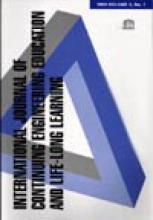Special Issue on: "Knowledge Management Technologies in Education"

Int. Journal of Continuing Engineering Education and Life-Long Learning - Special Issue on: "Knowledge Management Technologies in Education"
- Assistant Prof. Inaya Lahoud-Lemaitre, Galatasaray University, Turkey
- Assistant Prof. Elsa Cardoso, Instituto Universitário de Lisboa and Instituto de Engenharia de Sistemas e Computadores, Investigação e Desenvolvimento em Lisboa
- Prof. Nada Matta, University of Technology of Troyes, France
Suitable topics include, but are not limited, to the following:
- Educational knowledge management and ontologies
- Educational data mining
- Educational linked data and semantic web
- Knowledge acquisition, extraction and reuse in education
- Artificial intelligence, robotics and human-computer interaction in education
- Natural language processing to improve educational effectiveness
- Providing feedback to teachers and other stakeholders generated from EKM methods
- Learner or student modelling
- Learning analytics
- Educational information systems
- Improving educational software
- Practice learning experiences and techniques
- Evaluating and improving teachers' support
- Educational knowledge evolution
- Social media and games in learning
- Experiences and examples of the use of KM in education
- Global issues in education and research
- Visualisation of student learning patterns
Important Dates
Manuscripts due by: 30 August, 2018 => 21 September, 2018 (extended)
Notification to authors: 30 October, 2018
Final versions due by: 30 December, 2018
Notes for Prospective Authors
Submitted papers should not have been previously published nor be currently under consideration for publication elsewhere. (N.B. Conference papers may only be submitted if the paper has been completely re-written and if appropriate written permissions have been obtained from any copyright holders of the original paper).
All papers are refereed through a peer review process.
All papers must be submitted online. To submit a paper, please read the Submitting articles page (http://www.inderscience.com/info/inauthors/author_submit.php)
Dernière mise à jour : 30 août, 2018 - 10:35
